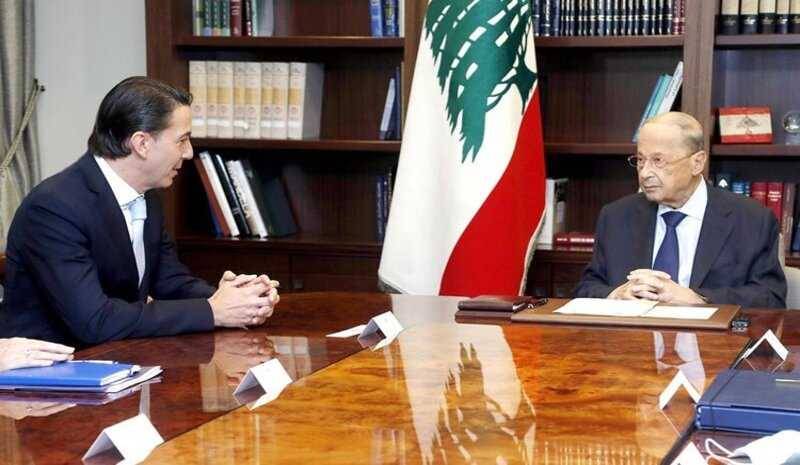After arduous communications and tireless mediations conducted by the Lebanese authorities at all levels, U.S. mediator Amos Hochstein is expected to visit Lebanon in the coming days. However, his visit will not be like previous ones due to developments related to the border demarcation file between Lebanon and Israel, specifically regarding the arrival of the Greek ship to commence drilling in the Karish field.
This visit comes against the backdrop of Hochstein's negative stance, with insiders indicating that he is "upset" over not receiving an official Lebanese response to his proposal, following his recent receipt from Israel of a response centered on the "jagged" demarcation line. At that time, Lebanon requested an official documented proposal to respond to. The U.S. mediator sent this via his ambassador in Lebanon, Dorothy Shea, which led to a meeting of the three presidents in Baabda, ending without a unified response other than inviting the U.S. mediator to return to Lebanon and resume his mediation efforts. He did not heed the call at that time, resulting in a standstill in the demarcation file from Lebanon's side, while Israel prepared for drilling.
According to information from "Asas", Lebanon is set to deliver an official response to Hochstein regarding his latest proposal. Efforts are ongoing to prepare the official legal text. It is still unknown how Lebanon's response will manifest and in which direction it will lean, but it will certainly not be negative. Can Lebanon diverge from the American stance while the drilling ship has reached the shared borders? How will the response take shape amid the profound divide between supporters of Line 23 and supporters of Line 29? And what if the Parliament finds itself compelled to approve a formula that forces the government to engage seriously with Line 29 and communicate with the United Nations based on it?
The situation is extremely critical and delicate. Authorities have entered a crucial phase in evaluating the situation and the implications of any possible step, while ensuring they do not relinquish Lebanon's rights or overlook Line 29, which would leave Israel free from obligations.
What will Hochstein hear? Preliminary atmospheres indicate that the U.S. mediator gave Lebanon prior notice that his visit would take place on the condition of not addressing Line 29 or discussing it; otherwise, there would be no need for his visit. Informed sources stated that Hochstein informed relevant officials that he is looking to visit Lebanon to continue negotiations from where they left off, but not within open deadlines or to negotiate for the sake of negotiation.
In light of this reality, Lebanon will enter this round of negotiations on a hot plate, under U.S. and Israeli pressure, with its only card being Israel's need for security guarantees at the maritime border to prevent the drilling contractor from stopping operations. If Hochstein visits Lebanon, it will naturally serve Israeli interests before Lebanese ones, which have yet to take any serious step concerning the demarcation file, except for correspondence with the United Nations. Lebanon will resend this correspondence to reassert its rights to its oil wealth and prevent Israel from extracting this wealth while forbidding Lebanon from beginning drilling before reaching an agreement with Israel on border demarcation.
It is also worthwhile to refer back to the statement of an Israeli official the day before yesterday, saying that the problem in Lebanon would be resolved diplomatically through the U.S. mediator.
Sources from Hezbollah: Hochstein returns to Lebanon while the Lebanese division over the two demarcation lines prevails, and negotiations with Israel over the maritime border have stalled. According to informed sources close to Hezbollah, Hochstein has exploited the Lebanese situation from the very beginning.
The sources believe that the ongoing debate among Lebanese over Lines 23 and 29 is at the core of the problem; without such internal disputes, the situation would be clear and wouldn’t require negotiations. So far, there is no definitive evidence that the Greek ship has crossed the line to the north.
Reliable sources confirmed that Hochstein would not have visited Lebanon after a series of objections to the visit had it not been for someone warning him that if he did not take action, the resistance would move, and it is not far-fetched that they would strike the oil platform, leading to a regional war.
Other sources reveal that Hochstein stipulated that he would receive a written response and that there would be complete Lebanese consensus, free from objections from any side. As of now, Lebanon has not officially been informed of the date and time of the visit, but it has been notified that the U.S. mediator will resume his work, this time under the pressure of the presence of the drilling ship, while Lebanon has no concrete proposal for its response yet.




